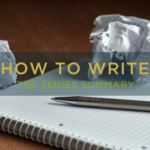Do you panic about spoiling and grammaring?
The time has come – so don’t panic!
If you’ve followed the steps outlined in the previous blog posts, you should now have a full outline for your own article. All that should be left is to get on and write.
Unfortunately, for a lot of people, this is where they get stuck. It is so easy get hung up on their writing being perfect. You feel that every word has to be perfectly spelled and grammatically correct and that’s when the panic sets in. You are so worried about a single mistake that you decide not to write anything as a better solution.
Pobody’s Nerfect
Okay – silly joke, but it is really important for you to remember this and not to let it be an obstacle to you writing.
That is not to say that spelling and grammar don’t matter – they do – but perfection is not as necessary as you might think. For instance, grammar is constantly changing: there is no definite ruling and the laws of grammar alter depending on how people write. Spelling is very important, but is now widely covered by spell check software, which you’ll have installed on virtually any word processing tool you care to use.
In addition, most materials are electronic, so they can be corrected easily and on the fly. This means that if you’re re-reading an article after you’ve already published it and you spot an error, you can always go back and correct it later (I do it that all the time – especially after someone has messaged me and pointed out some goof in one of my blogs – for which I am always grateful!).
Finally, even professional proofreaders miss things. No matter how much you read and re-read your work, errors slip through the net. Once, in a previous job, 600 copies of a booklet called “Change in the Public Sector” were printed before anyone involved in the process (author, proofreader, designer, quality controller, marketing team) spotted that the ‘L’ had been missed out of the word ‘Public.’ That would have brightened the day of quite a few civil servants had it been sent out to them!!!
So it happens. Don’t let it stop you writing.
5 way to polish up your article
With that said, here are five tips to iron out your worst mistakes:
- Re-read your content later: Wait at least 24 hours after writing and have another look to see things that you’ve missed
- Read it out loud: As humans, we read fast but we speak slowly. Force yourself to slow down by reading aloud. It will also help to ensure that you write like you speak.
- Build a list of ‘often wrong’ words: Work out what mistakes you are prone to make. For instance I often write lead, instead of led, so I’m always on the lookout for that.
- Get someone to read it for you: Getting someone else’s input can be very valuable and they will see mistakes which you don’t. At the same time be sure to stick to your guns if they suggest a change in the content which really matters to you or takes your article in a different. Remember, you’re the writer.
- If you are going to physically print the article, repeat these steps when you have the design spreads back. It looks different when it’s on paper as opposed to the screen, and you’ll probably spot more.
If you repeat each of these steps with every new piece of work, the only mistakes left should be minor ones which slip through the cracks and can be forgiven.
Apply the CARES checklist
This is a second and different tool you can use too. It helps you look objectively at your writing. In anything you write, follow the Creative Words CARES checklist:
- Clear: Is it obvious what point you are trying to make? If not, why not?
- Accurate: Do the words mean what you think they mean? Are your statements backed up by fact or are they just “fake news”?
- Relevant: Does your article remain relevant to the core idea? If you deviate too much, remove the irrelevant material. You can always use it for another article another time.
- Easy: Is it easy for the reader to find what they need to know?
- Simple: Are you using simple words and sentences? Readers are going to be discouraged if your article looks like you’ve just swallowed a thesaurus.
Your mission this week, should you choose to accept it, is to use your outline from last time to properly draft your article. It could be long or short, depending on the purpose. Make sure to use the outline to help you get the entire point across without going over the word limit.












Leave a Reply
Want to join the discussion?Feel free to contribute!